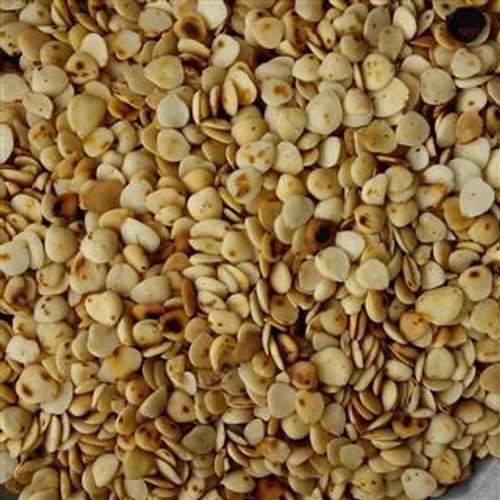Product Overview
Parts used: Dried ripe seeds
TCM category: Herbs that relieve coughing and wheezing
TCM nature: Warm
TCM taste(s): Bitter Sweet
Meridian affinity: Large intestine Lung
Scientific name: Prunus armeniaca, Prunus sibirica or Prunus mandshurica
Use of apricot seeds (Xing Ren) in TCM
Please note that you should never self-prescribe TCM ingredients. A TCM ingredient is almost never eaten on its own but as part of a formula containing several ingredients that act together. Please consult a professional TCM practitionner, they will be best able to guide you.
Preparation: Remove the seeds from the apricot and dry them.
Dosage: 3 - 9 grams
Main actions according to TCM*: Stops cough and wheezing caused by either Heat or Cold. Lubricates the Intestines and relieves constipation.
Primary conditions or symptoms for which apricot seeds may be prescribed by TCM doctors*: Coughing Asthma Bronchitis Dry cough Constipation
Contraindications*: This herb should be used with caution when there is Yin Deficiency and with infants. It should not be used when there is diarrhea. Eating too much may cause cyanide intoxication because apricot seeds contain hydrocyanic glycosides.
Common TCM formulas in which apricot seeds are used*:
For Wind-Cold cough combine apricot seeds with platycodon roots (Jie Geng), tangerine peel (Chen Pi) and perilla leaves (Zi Su Ye).
For Wind-Heat cough combine apricot seeds with platycodon roots (Jie Geng), mulberry leaves (Sang Ye) and snake gourds (Gua Lou).
For asthma or chronic bronchitis combine apricot seeds with ginkgo nuts (Bai Guo), ephedra (Ma Huang), perilla seeds (Zi Su Zi), coltsfoot flowers (Kuan Dong Hua), mulberry bark (Sang Bai Pi), baikal skullcap roots (Huang Qin), crow-dipper rhizomes (Ban Xia) and liquorice (Gan Cao).
For chronic Lung Deficiency coughs combine apricot seeds with chinese plums (Wu Mei), crow-dipper rhizomes (Ban Xia), tangerine peel (Chen Pi) and fresh ginger (Sheng Jiang).
For rheumatic and arthritic conditions combine apricot seeds with job's tears (Yi Yi Ren), ephedra (Ma Huang) and liquorice (Gan Cao).
For asthma with excessive phlegm combine apricot seeds with perilla seeds (Zi Su Zi), crow-dipper rhizomes (Ban Xia) and ephedra (Ma Huang).
For ascites (abnormal accumulation fluid in the abdomen) combine apricot seeds with croton fruits (Ba Dou).
For chronic constipation due to dryness or Qi deficiency combine apricot seeds with bush cherry pits (Yu Li Ren) and hemp seeds (Huo Ma Ren).
For phlegm obstruction with coughing, wheezing combine apricot seeds with coltsfoot flowers (Kuan Dong Hua).
For chronic cough combine apricot seeds with honey (Feng Mi), perilla seeds (Zi Su Zi), fresh ginger (Sheng Jiang) and unprepared rehmannia (Di Huang).
For parched throat, blood-tinged sputum and Lung Yin deficiency combine apricot seeds with american ginseng (Xi Yang Shen), mulberry leaves (Sang Ye) and loquat leaves (Pi Pa Ye).
Key TCM concepts behind apricot seeds (Xing Ren)'s properties
In Traditional Chinese Medicine (TCM), apricot seeds are plants that belong to the 'Herbs that relieve coughing and wheezing' category. In TCM Phlegm is a condition of Stagnation of Fluids which tends to start in the Spleen and then goes to the Lungs. If this overly accumulates it thickens and becomes pathological Phlegm. Phlegm, being a form of Stagnation, often starts as being Cool and transforms to Hot as the condition progresses. Herbs that relieve coughing and wheezing treat branch symptoms of this Stagnation and tend to have antitussive, expectorant, diuretic or laxative properties.
Furthermore apricot seeds are plants that are Warm in nature. This means that apricot seeds tend to help people who have too much "cold" in their body, although with less effect than a plant that would be Hot in nature. Balance between Yin and Yang is a key health concept in TCM. Those who have too much cold in their body are said to either have a Yin excess (because Yin is Cold in nature) or a Yang deficiency (Yang is Hot in Nature). Depending on your condition apricot seeds can help restore a harmonious balance between Yin and Yang.
Apricot seeds also taste Bitter and Sweet. The so-called "five elements" theory in Chinese Medicine states that the taste of TCM ingredients is a key determinant of their action in the body. Bitter ingredients like apricot seeds tend to have a cleansing action on the body by clearing heat, drying dampness and promoting elimination via urination or bowel movements. On the other hand Sweet ingredients tend to slow down acute reactions and detoxify the body. They also have a tonic effect because they replenish Qi and Blood.
The tastes of ingredients in TCM also determine what organs and meridians they target. As such apricot seeds are thought to target the Large intestine and the Lung. In TCM the Large Intestine receives the "impure" parts of the digested food from the Small Intestine, absorbs the remaining fluids and excrete the remainder as feces. In addition to performing respiration, the Lungs are thought to be a key part of the production chain for Qi and the body fluids that nourish the body.









